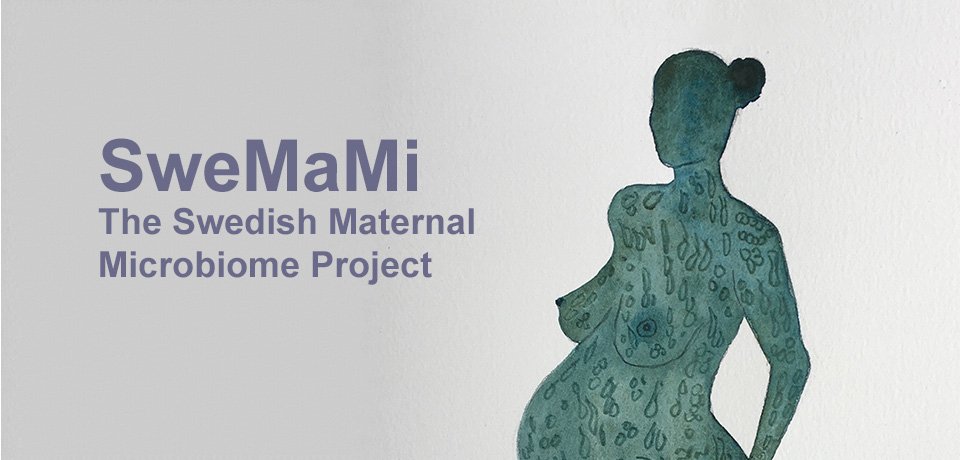SweMaMi
The Swedish Maternal Microbiome Project
Recruitment has now been closed. Find our first article and more information on our website.
Could your microbiome predict a healthy pregnancy and delivery?
The microbiome refers to the community of all bacteria, viruses and other micro-organisms residing at the different locations of your body, of which many are believed to have a beneficial effect on your health.
With this large project we would like to explore how the microbiome during pregnancy is related to pregnancy-related medical problems in expecting mothers and their babies, to hopefully be able to detect, prevent and treat these in the (near) future. Therefore, we would like your help and invite you to participate if:
- You are older than 18 years and you are before your 19th week of pregnancy
- You are residing in Sweden, and you have a personal identification number (”personnummer”) and postal address in Sweden (to send the home-sampling kits)
- You are sufficiently fluent in Swedish or English to complete our web-based questionnaires
Most pregnancies proceed without any major problems and lead to a normal delivery with healthy babies. Complications in the mother and child are uncommon but do occur, for example preterm birth (when the baby is born before 37 weeks) occurs in approximately 5% of all pregnancies. Yet, it is still hard to predict which women are at risk for complications. We therefore want to examine if the microbiome could be a way to measure health and predict possible pregnancy-related complications in expecting mothers and their children, for example pre-term birth.
Since we want to reach as many pregnant women as possible and plan to recruit and follow-up 2500 women all over Sweden, you can participate completely from home, without any need for medical check-ups or additional trips to your antenatal clinic or elsewhere.
We would like you to fill-in a web-based questionnaire (in English or Swedish) including among others, questions regarding your general health, your pregnancy, and dietary habits at three time points during your pregnancy: around week 17-19; around week 28-30, and 6-10 weeks after your expected delivery date. A few days after you have completed each questionnaire, you will receive an envelope at home including a self-sampling kit with instructions, so you can take the required samples yourself and send them back to our laboratory by mail with the enclosed pre-paid envelope (within one week after receiving the kit) for the analyses.
We would like you to collect samples at different body sites: your mouth (saliva), your vagina (soft swab), and your rectum (stool sample), which takes 5-10 minutes in total. At the last time-point, we will also ask you to collect a stool sample from your baby (from the diaper). So you will have to answer a questionnaire three times, and self-sample three times.
All sampling procedure are without any known health risk to your or your child, and are not painful but could lead to some minor and temporary discomfort

Popular science summary
The maternal microbiome, the collection of bacteria, viruses and microorganisms in particular the oral cavity, the vagina and the gastrointestinal tract, is believed to have important effects on the health of mothers and their children. It has been associated with preterm birth, preeclampsia, pregnancy diabetes and excessive weight gain during pregnancy, all of which are common and serious complications to pregnancy. Several factors are believed to affect this relationship, including drug use (e.g. antibiotics), lifestyle and diet.
The majority of existing microbiome studies during pregnancy are based on relatively small study populations and due to the large variation in the microbiome composition it is still unclear how a healthy and unhealthy microbiome differs. Therefore, the purpose of this project is to evaluate the relationship between maternal microbiome during and after pregnancy and the risk of complications in mother and child.
Microbiome samples will be collected from 2,500 pregnant women in Sweden during pregnancy week 17-19, pregnancy week 28-30 and 6-10 weeks after childbirth. Data collection via questionnaires will be done at the same time as above, and this data will then be linked with Swedish health records (especially the drug register) in combination with childbirth data. This will enable reliable evaluation of complications for mothers and children taking into account potential factors in the form of inter alia lifestyle factors and drug use.
Microbiome sampling is a procedure that is at low risk for the woman and is unlikely to be a risk to the unborn child, and causes no or only minimal and temporary discomfort. As the procedure for sampling is easy to implement, it may be introduced in the screening of pregnant women to identify unhealthy microbiome in the future if this would be assessed costly and cost-effectively. Therefore, we believe our research will be of great importance to many families in the future.
Research team
Forskarassistent
Nele Brusselaers
Enhet:Lars Engstrand grupp
E-post:nele.brusselaers@ki.se
Lektor, adjungerad
Eva Itzel
Enhet:Institutionen för klinisk forskning och utbildning, Södersjukhuset (KI SÖS), S1
E-post:eva.wiberg-itzel@ki.se
Direktör
Ina Schuppe Koistinen
Telefon:08-524 845 97
Enhet:Lars Engstrand grupp
E-post:ina.schuppe.koistinen@ki.se
Professor
Lars Engstrand
Enhet:Institutionen för mikrobiologi, tumör- och cellbiologi (MTC), C1
E-post:lars.engstrand@ki.se
Forskarassistent
Emma Fransson
Enhet:Lars Engstrand grupp
E-post:emma.fransson@ki.se
Enhetschef
Marica Hamsten
Telefon:08-524 845 97
Enhet:CTMR
E-post:marica.hamsten@ki.se
Forskarassistent
Juan Du
Telefon:076-894 89 35
Enhet:Lars Engstrand grupp
E-post:juan.du@ki.se
Postdoc
Luisa Warchavchik Hugerth
Enhet:Lars Engstrand grupp
E-post:luisa.warchavchik.hugerth@ki.se
Anknuten
Hanna Danielsson
E-post:hanna.danielsson@ki.se
Forskarstuderande
Alexandra Goldberg
Enhet:Institutionen för klinisk forskning och utbildning, Södersjukhuset (KI SÖS), S1
E-post:alexandra.goldberg@ki.se
Contact us
SweMaMi
The Centre for Translational Microbiome Research (CTMR)
Department of Microbiology, Tumor and Cell biology
Karolinska Institutet
Nobelsväg 16, 17177
Stockholm
email: swemami@mtc.ki.se
Phone: 0722187905
Collaborators
